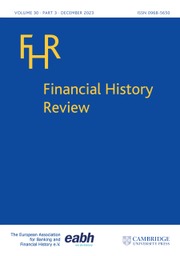Article contents
The Great Depression analogy1
Published online by Cambridge University Press: 14 July 2010
Extract
In the discussion of our contemporary economic disease, the Great Depression analogy refuses to go away. Almost every policy-maker referred to conditions that had ‘not been seen since the Great Depression’, even before the failure of Lehman. Some even went further – the Deputy Governor of the Bank of England notably called the crisis the worst ‘financial crisis in human history’. In its April 2009 World Economic Outlook, the IMF looked explicitly at the analogy not only in the collapse of financial confidence, but also in the rapid decline of trade and industrial activity across the world. In general, history rather than economic theory seems to offer a guide in interpreting wildly surprising and inherently unpredictable events. Some observers, notably Paul Krugman, have concluded that a Dark Age of macroeconomics has set in.
- Type
- The past mirror: notes, surveys, debates
- Information
- Copyright
- Copyright © European Association for Banking and Financial History e.V. 2010
References
2 IMF, World Economic Outlook, 2009 (April)Google Scholar.
3 Krugman, P., ‘How did economists get it so wrong?’, New York Times Magazine, 6 September 2009Google Scholar.
4 Meltzer, A. H., A History of the Federal Reserve, vol. 1:1913–1951 (Chicago, 2003)Google Scholar.
5 Eggertsson, G., ‘Great expectations and the end of the Depression’, American Economic Review, 94 (2008), pp. 1476-1516CrossRefGoogle Scholar.
6 Romer, C., ‘What ended the Great Depression?’, Journal of Economic History, 52 (1992), pp. 757-84CrossRefGoogle Scholar.
7 Cole, H. and Ohanian, L., ‘New Deal policies and the persistence of the Great Depression: a general equilibrium analysis’, Journal of Political Economy, 112 (2004), pp. 779-816CrossRefGoogle Scholar.
8 Meltzer, A History of the Federal Reserve, pp. 520-1.
9 Friedman, M. and Schwartz, A. J., A Monetary History of the United States: 1867–1960 (Princeton, 1963), pp. 526-34Google Scholar; Meltzer, A History of the Federal Reserve, pp. 521-34.
10 S. Sumner, ‘Chapter 12. The Roosevelt Depression’, mimeo, Bentley College, September 2009.
11 G. Eggertsson and B. Pugsley, ‘The mistake of 1937: a general equilibrium analysis’, Center for Financial Studies Working Paper 2007/06.
12 Brunner, K. and Meltzer, A. H., ‘Liquidity traps for money, bank credit, and interest rates’, Journal of Political Economy, 76 (1968), pp. 1-37CrossRefGoogle Scholar.
13 P. F. Basile and H. Rockoff, ‘Money and interest rates in the interwar years’, mimeo, Rutgers University, September 2009.
14 Orphanides, A., ‘Monetary policy in deflation: the liquidity trap in history and practice’, North American Journal of Economics and Finance, 15 (2004), pp. 101-24CrossRefGoogle Scholar.
15 Hetzel, R., ‘Monetary policy in the 2008-2009 recession’, Federal Reserve Bank of Richmond Economic Quarterly, 95.2 (2009), pp. 201-33Google Scholar.
16 M. Goodfriend, ‘Central banking in the credit turmoil: an assessment of Federal Reserve Practice’, paper presented at the Bank of Japan International Conference ‘Financial System and Monetary Policy Implementation’, 27-28 May, 2009, Institute for International and Economic Studies, Bank of Japan, Tokyo.
17 M. Mussa, ‘Global economic prospects as of September 2009: onward to global recovery’, mimeo, Peterson Institute, September 2009.
18 Nötel, R., ‘Money, banking and industry in interwar Austria and Hungary’, Journal of European Economic History, 13.2 (1984)Google Scholar.
19 Temin, P., ‘The German crisis of 1931: evidence and tradition’, Cliometrica, 2 (2008), pp. 5-17CrossRefGoogle Scholar.
20 James, H., The German Slump: Politics and Economics 1924–1936 (Oxford, 1986)Google Scholar.
21 James, H., The End of Globalization: Lessons from the Great Depression (Cambridge, MA, 2001), pp. 70-4Google Scholar; O. Accominotti, ‘London merchant banks, the Central European panic and the sterling crisis of 1931’, mimeo, Geneva Graduate Institute, 2009.
22 Bähr, J. and Ziegler, D., Die Dresdner Bank in der Wirtschaft des Dritten Reichs (Munich, 2006), p. 82Google Scholar.
23 Kindleberger, C. P., The World in Depression (Berkeley, 1973)Google Scholar.
24 Huan, Y., Capitalism with Chinese Characteristics: Entrepreneurship and the State (Cambridge, 2008), p. 212CrossRefGoogle Scholar.
25 Mussa, ‘Global economic prospects’.
- 14
- Cited by


